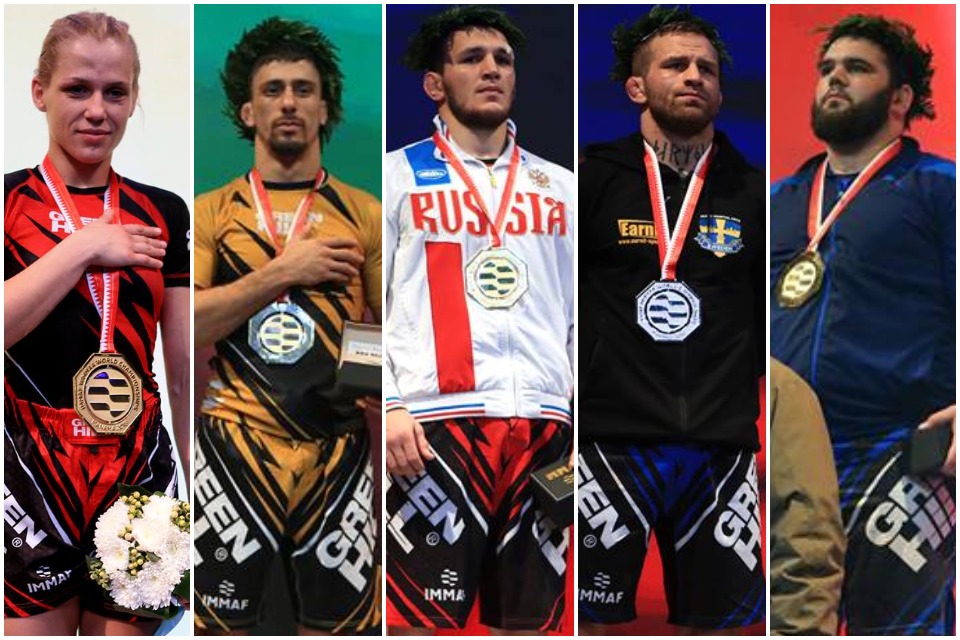By IMMAF.org lead writer, Jorden Curran After the grandest world championships to date, IMMAF’s official rankings have welcomed the first wave of junior contenders, a new senior pound-for-pound king, and the imposing emergence of a major new player in the international team standings. In the aftermath of the 2018 IMMAF-WMMAA Unified World Championships, as the year of 2018 concludes, here are the standout movers and shakers of 56 total nations following the latest rankings update of senior national teams. *Due to ongoing technical updates, individual division lists are pending while team rankings and pound-for-pound rankings are available for Senior and Junior competitors, respectively. SENIOR TEAM RANKINGS SWEDEN (1) Since the 2015 European Open, Sweden had secured gold medals in every championship that the nation’s athletes had contested, until now. Team Russia battered down the gates and assumed an overwhelming dominance of the first Unified World Championships, but nevertheless, Sweden’s own dominance over the past four years secured the foundation for retaining the no.1 ranked team position, supplemented at the World Championships with two silvers and one bronze medal in addition to topping the year’s European Open medal table. The narrowed lead still affords SMMAF the opportunity to review the 2019 schedule and rally the team with a view to staying on top. BAHRAIN (3>2) After a difficult semi-final day that saw four of the nation’s top medal hopefuls eliminated, in addition to the pre-event injury withdrawal of light-heavyweight world champion Murtaza Talha Ali, the pressure was on for host nation Bahrain to secure gold on home soil after an ultra-successful 2017 campaign. Achieving two silver medals along the way, it took until the final bout of this year’s World Championships Finals where new super heavyweight recruit Pasha Kharkhachaev stunned Russian national champion Grigoriy Ponomarev with the most impactful knockout of the week. The triumph proved vital in seeing the Kingdom of Bahrain edge the chasing pack to become the world’s number-two nation. BULGARIA (2>4) Second only to Sweden, Bulgaria had maintained its own considerable stake of gold medal accolades since emerging at the 2015 Euros, through long standing champions such as Alexandra Toncheva, Daniel Galabarov and Ferdun Osmanov, who have since taken on pro careers. Like Sweden, the value of past triumphs and a strong European Open medal haul is proving its worth, while the conveyor of home grown talent works to maintain the new wave of top contenders. Dropping from second to fourth, the nation’s sole World Championships gold was salvaged by undefeated defending world featherweight champion, Delyan Georgiev, whose accomplishments have excelled him to the very top of the pound-for-pound mountain. RUSSIA (17>3) The most impressive rankings leap since the inception of IMMAF rankings in 2015; the amalgamation of IMMAF and WMMAA has revitalized Russia’s presence on the international amateur stage. Smashing the record for most world championship finalists and gold medals won, the nation advances from 17th to 3rd place, edging out Bulgaria with sights firmly set on becoming number-one. FINLAND (6>5) Now breaking into the world’s top five, 2018 saw a fresh introduction of Finland as gold medal contenders, having previously been right up there as one of the most successful teams from 2014 to 2015. Before claiming three world championship silvers and one bronze at this year’s Worlds, a slight increase on 2017’s 2 silver-2 bronze, Finland displayed its newly enhanced team depth at the European Open, placing second behind Sweden in the medal table with an impressive 2 golds, 2 silvers and 5 bronze. REPUBLIC OF IRELAND (14>9) At the 2016 World Championships in Las Vegas, Ireland enjoyed the overall highest medal count (6), but with two senior world champions crowned in 2018 (plus Ger Harris in the junior championships), the IMMAA national team claimed the event’s second highest gold tally, their best to date. Also with Ryan Spillane’s heavyweight double crown triumph in winning the 2018 World and European Championships, the Emerald Isle enters the world top ten. UKRAINE (25>10) Another of the year’s most improved teams, further complimenting the IMMAF-WMMAA amalgamation, Ukraine jumps a massive 15 places to enter the top ten. Men’s lightweight standout Pavel Senchenko set the tone with gold at the European Open, and the nation went on to medal at the world championships with three bronze and two silvers while women’s strawweight Daria Samchik won gold for her country with a tremendous showing in her tournament debut. UK (10>18) Despite promising tournament veterans such as Christian Duncan, and one of the largest national teams, the UK has noticeably felt the brunt of the ever increasing depth of talent on the international platform. While being the second most accomplished team of the Junior World Championships, the UK’s senior ranks experienced the nation’s worst showing to date, unable to secure a single medal as the last hopefuls suffered defeat in the highly competitive quarter-finals. The nation drops out of the world’s top ten, to 18th place. USA (9>11) The original superpower of the IMMAF platform, the USA has experienced mixed fortunes over the last three years as the likes of Sweden, Bulgaria, Bahrain and now Russia have frequented the podium at a higher rate. Despite dropping out of the top ten, the UMMAF national team maintained the nation’s flawless record of never failing to achieve a World Championships gold, this year via the devastating punching power of women’s bantamweight LaNeisha Vinson. The slight lead ahead of Romania (12th) makes Darian Weeks’ Oceania Open title win all the more significant. Click below for current Senior and Junior National Team Rankings and Pound-for-Pound Rankings. IMMAF Senior Team Rankings Nov.18 IMMAF Junior Team Rankings Nov.18 IMMAF Senior Rankings Nov.18 IMMAF Junior Rankings Nov.18]]>

